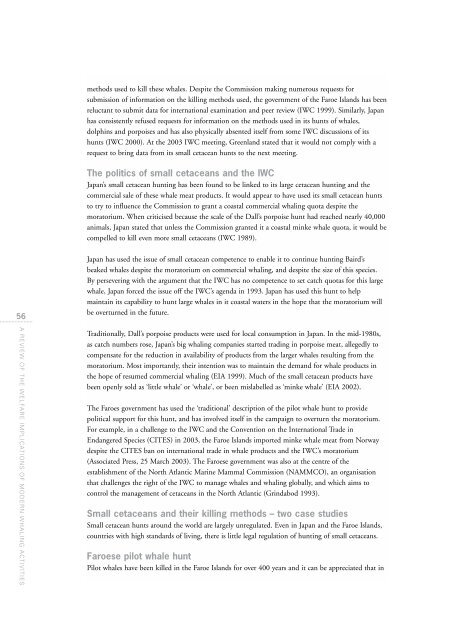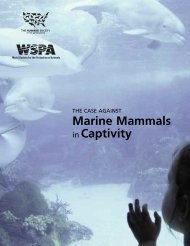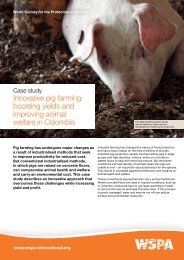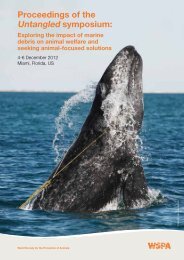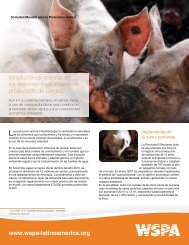For example, Greenl<strong>and</strong> <strong>and</strong> the Faroe Isl<strong>and</strong>s, represented by Denmark, <strong>and</strong> Japan strongly opposeany action by the IWC on small cetaceans. They have not permitted the IWC’s Scientific Committeeor its Working Groups <strong>and</strong> Workshops on <strong>Whale</strong> Killing Methods <strong>and</strong> Associated Welfare Issues toexamine their hunting practices, <strong>and</strong> have ignored IWC guidance (personal observation). Thesecountries do not appear to have carried out conclusive research into the sustainability of hunts. Japanis thought to be putting huge pressure on small cetacean populations (see section on The JapaneseDall’s porpoise <strong>and</strong> Baird’s beaked whale hunts later in this chapter) <strong>and</strong> there are growing concernsabout the status of beluga <strong>and</strong> narwhals which are hunted in Greenl<strong>and</strong> but for which no quotas areset.Most small cetacean species live in coastal waters <strong>and</strong> several Latin American countries have resistedIWC actions on small cetaceans, claiming conflicts with their sovereignty over their 200-mileexclusive economic zones (EEZs). Recently, however, most of these countries have recognised theimportance of the IWC’s work on small cetaceans, <strong>and</strong> have contributed to it constructively.Within the IWC, the decision as to which species is considered to be a small cetacean is not set byany specific criteria. Some inconsistencies have resulted. For example, the toothed Baird’s beakedwhale has generally been considered to be a small cetacean despite reaching a size of 12.8 metres(42ft). Conversely the toothed North Atlantic bottlenose whale <strong>and</strong> the baleen minke whale, bothabout 10 metres (33ft), are considered to be ‘great whales’ <strong>and</strong> it is accepted by all countries that theyare protected by the moratorium on commercial whaling. It is recognised that this type of anomalycan result in difficulties in determining what appropriate regulations do apply <strong>and</strong> there is clearly aneed for a more uniform approach to be taken. This would enable regulations to be more readilyapplied.THE SMALL CETACEAN DIMENSION55History of small cetacean action by the IWCThe IWC set up a sub-committee on Small Cetaceans of its Scientific Committee in 1974, <strong>and</strong> hascreated a valuable database of information on small cetaceans. It has reviewed the status of speciesafter species <strong>and</strong> made constructive recommendations to assist with conservation strategies. Until1986, however, the Commission itself took no specific action to conserve or manage small cetaceans.In 1986, the Technical Committee of the IWC, in an effort to reduce the cruelty of the pilot whalehunt, called on the Faroese government to minimize the use of the gaff or whaling hook, restrict theuse of the hook from boats, <strong>and</strong> reduce the number of official ‘whaling’ bays used in the hunts. TheFaroese government enacted these recommendations only in part (IWC 1988).Concerned about the high numbers of Dall’s porpoises being killed in Japanese waters <strong>and</strong>responding to concerns of Japanese scientists about the sustainability of the hunt, in 1990 the IWCadopted its first ever resolution on small cetaceans with only one vote against – that of Denmarkrepresenting the Faroes. The resolution called on the government of Japan to reduce the takes ofDall’s porpoises to at least the levels taken before 1986, approximately 10,000 per year (IWC 1990).Japan abstained on the vote.The Commission has thus formally demonstrated its competence to make managementrecommendations on small cetaceans <strong>and</strong>, since 1990, has passed numerous other small cetaceanresolutions. Repeatedly, the IWC’s working groups <strong>and</strong> workshops on whale killing methods <strong>and</strong>associated welfare issues have examined the Faroese pilot whale hunt <strong>and</strong> expressed concern about the
methods used to kill these whales. Despite the Commission making numerous requests forsubmission of information on the killing methods used, the government of the Faroe Isl<strong>and</strong>s has beenreluctant to submit data for international examination <strong>and</strong> peer review (IWC 1999). Similarly, Japanhas consistently refused requests for information on the methods used in its hunts of whales,dolphins <strong>and</strong> porpoises <strong>and</strong> has also physically absented itself from some IWC discussions of itshunts (IWC 2000). At the 2003 IWC meeting, Greenl<strong>and</strong> stated that it would not comply with arequest to bring data from its small cetacean hunts to the next meeting.The politics of small cetaceans <strong>and</strong> the IWCJapan’s small cetacean hunting has been found to be linked to its large cetacean hunting <strong>and</strong> thecommercial sale of these whale meat products. It would appear to have used its small cetacean huntsto try to influence the Commission to grant a coastal commercial whaling quota despite themoratorium. When criticised because the scale of the Dall’s porpoise hunt had reached nearly 40,000animals, Japan stated that unless the Commission granted it a coastal minke whale quota, it would becompelled to kill even more small cetaceans (IWC 1989).56A REVIEW OF THE WELFARE IMPLICATIONS OF MODERN WHALING ACTIVITIESJapan has used the issue of small cetacean competence to enable it to continue hunting Baird’sbeaked whales despite the moratorium on commercial whaling, <strong>and</strong> despite the size of this species.By persevering with the argument that the IWC has no competence to set catch quotas for this largewhale, Japan forced the issue off the IWC’s agenda in 1993. Japan has used this hunt to helpmaintain its capability to hunt large whales in it coastal waters in the hope that the moratorium willbe overturned in the future.Traditionally, Dall’s porpoise products were used for local consumption in Japan. In the mid-1980s,as catch numbers rose, Japan’s big whaling companies started trading in porpoise meat, allegedly tocompensate for the reduction in availability of products from the larger whales resulting from themoratorium. Most importantly, their intention was to maintain the dem<strong>and</strong> for whale products inthe hope of resumed commercial whaling (EIA 1999). Much of the small cetacean products havebeen openly sold as ‘little whale’ or ‘whale’, or been mislabelled as ‘minke whale’ (EIA 2002).The Faroes government has used the ‘traditional’ description of the pilot whale hunt to providepolitical support for this hunt, <strong>and</strong> has involved itself in the campaign to overturn the moratorium.For example, in a challenge to the IWC <strong>and</strong> the Convention on the International Trade inEndangered Species (CITES) in 2003, the Faroe Isl<strong>and</strong>s imported minke whale meat from Norwaydespite the CITES ban on international trade in whale products <strong>and</strong> the IWC’s moratorium(Associated Press, 25 March 2003). The Faroese government was also at the centre of theestablishment of the North Atlantic Marine Mammal Commission (NAMMCO), an organisationthat challenges the right of the IWC to manage whales <strong>and</strong> whaling globally, <strong>and</strong> which aims tocontrol the management of cetaceans in the North Atlantic (Grindabod 1993).Small cetaceans <strong>and</strong> their killing methods – two case studiesSmall cetacean hunts around the world are largely unregulated. Even in Japan <strong>and</strong> the Faroe Isl<strong>and</strong>s,countries with high st<strong>and</strong>ards of living, there is little legal regulation of hunting of small cetaceans.Faroese pilot whale huntPilot whales have been killed in the Faroe Isl<strong>and</strong>s for over 400 years <strong>and</strong> it can be appreciated that in
- Page 5 and 6:
ForewordWhales are highly evolved a
- Page 7:
1 Executive SummaryThis review exam
- Page 11 and 12: 2 A background to whalingPhilippa B
- Page 13 and 14: y the weapon’s enormous recoil, w
- Page 15 and 16: Japan currently whales in the Antar
- Page 17 and 18: Otto, K. 1997. Animal Pain Behaviou
- Page 19 and 20: Protecting the welfare of animals i
- Page 21 and 22: Toothed whales (Odontoceti)Toothed
- Page 23 and 24: Social behaviourMother-calf pairsOn
- Page 25 and 26: to store and pass on information to
- Page 27 and 28: Communication in great whalesThe mo
- Page 29: Self-awarenessOne of the most compe
- Page 32 and 33: J.G.M. Thewissen), pp. 158-162. Aca
- Page 34 and 35: Whitehead, H., Waters, S. and Lyrho
- Page 36 and 37: humanitarian purposes the time take
- Page 38 and 39: Welfare and the modern IWCFrom 1980
- Page 40 and 41: 1996 UK proposes guidelines for col
- Page 42 and 43: Section TwoWhale killing6 Commercia
- Page 44 and 45: Table 1 Commercial, special permit
- Page 46 and 47: It can be argued that the figures f
- Page 48 and 49: Since struck and lost whales can in
- Page 50 and 51: equipment to Russian subsistence wh
- Page 52 and 53: This is the time from the throwing
- Page 54 and 55: Table 3 Aboriginal Subsistence Whal
- Page 56 and 57: International Aid For Korean Animal
- Page 58 and 59: 29 In Resolution 1999-1, the IWC no
- Page 62 and 63: the past they made an important con
- Page 64 and 65: however, has been made on the exten
- Page 66 and 67: hunt indicate that the whales are s
- Page 68 and 69: 8 Weather, sea condition and shipmo
- Page 70 and 71: chance of fog decreases from 15 to
- Page 72 and 73: experienced in December, or y could
- Page 74: 9 The potential stress effects ofwh
- Page 77 and 78: Both chase and pursuit cause stress
- Page 79 and 80: and manifest in a series of lethal
- Page 81 and 82: Ridgeway, S. H. (1966). Dall porpoi
- Page 83 and 84: 10 Euthanasia of cetaceansPhilippa
- Page 85 and 86: for the task. The correct target ar
- Page 87 and 88: whales the size of minke whales (Ø
- Page 89 and 90: 11 Review of criteria for determini
- Page 91 and 92: It is apparent from Figure 1, that,
- Page 93 and 94: interpreted criteria, comparisons o
- Page 95 and 96: 90A REVIEW OF THE WELFARE IMPLICATI
- Page 97 and 98: 12 A comparison betweenslaughterhou
- Page 99 and 100: include levels of premature mortali
- Page 101 and 102: the emphasis during some whaling op
- Page 103 and 104: affect an immediate and thereby law
- Page 105 and 106: Table 1 Animal welfare and the Sche
- Page 107 and 108: CIWF Trust, 2002. Farm Assurance Sc
- Page 109 and 110: 13 Ethics and whaling under special
- Page 111 and 112:
Table 1. Consideration of the 3Rs i
- Page 113 and 114:
skin samples, without the need for
- Page 115 and 116:
IWC (2001) Report of the Scientific
- Page 117 and 118:
Whales and the lawCetaceans (and wh
- Page 119 and 120:
scientific and technical committees
- Page 121 and 122:
ASCOBANS came into force in 1994. F
- Page 123 and 124:
The Treaty of the Panama Canal, ena
- Page 125 and 126:
2 As a result, their need for prote
- Page 127 and 128:
law says, but also the extent to wh
- Page 129 and 130:
15 Whaling and welfarePhilippa Brak
- Page 131 and 132:
commercial whaling. Times to death
- Page 133 and 134:
eath). Using the current criteria t
- Page 135 and 136:
possibility of establishing a simil
- Page 137 and 138:
international customary law and exi
- Page 139 and 140:
16 Summary of conclusionsModern day
- Page 141 and 142:
Glossary136A REVIEW OF THE WELFARE
- Page 143 and 144:
138A REVIEW OF THE WELFARE IMPLICAT
- Page 145 and 146:
Appendix IIColour plates©Mark Voti
- Page 147 and 148:
142A REVIEW OF THE WELFARE IMPLICAT
- Page 149 and 150:
Figure 13. Processing minke whales


